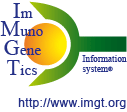Telomerase
Telomerase is a specialized ribonucleoprotein polymerase (RNA-dependent DNA polymerase) that stabilizes telomere lengths by adding hexameric (TTAGGG) repearts to the telomeric ends of chromosomes, thereby circumventing the cumulative damage that normally occurs during mitotic cell division.
Telomerase is expressed in embryonic cells, in male germ, cells and in proliferative cells such as hematopoietic sterm cells, activated lymphocytes and the intestinal crypt cells. A lack of telomerase activity in normal somatic cells limits their replicative capacity.
Telomerase recognizes the G-rich strand of an existing telomere repeat sequence and elongates it in the 5'-to 3' direction. Progressive loss of telomeres, a key feature of normal cells, is considered a major regulator of cellular senescence. On the other hand, telomere shortening due to the end-replication intricacy is considered an ultimate tumor suppressor mechanism. Tumor cells overcome this problem by overexpressing telomerase that contributes to an endless cycle of cell division. Cancer cells, on an average, possess shorter telomeres than normal cells. Hence, without an active telomerease to maintain telomere length, cancer cells could reach critically short telomere length at a faster pace than normal cells.
Telomerase activity, practically undetectable in normal cells, is detected in a majority of tumor cells. The presence of telomerase activity is correlated with poor clinical outcome in cancer patients. Hence, telomerase activity and telomereses, in addition to serving as new cancer markers, are potential therapeutic targets for the management of disease progression. More recently, optimism in using telomerase inhibitors in cancer treatment has grown which the hope that the use of these inhibitors may force immortal cancer cells into a normal pattern of senescence and death.



